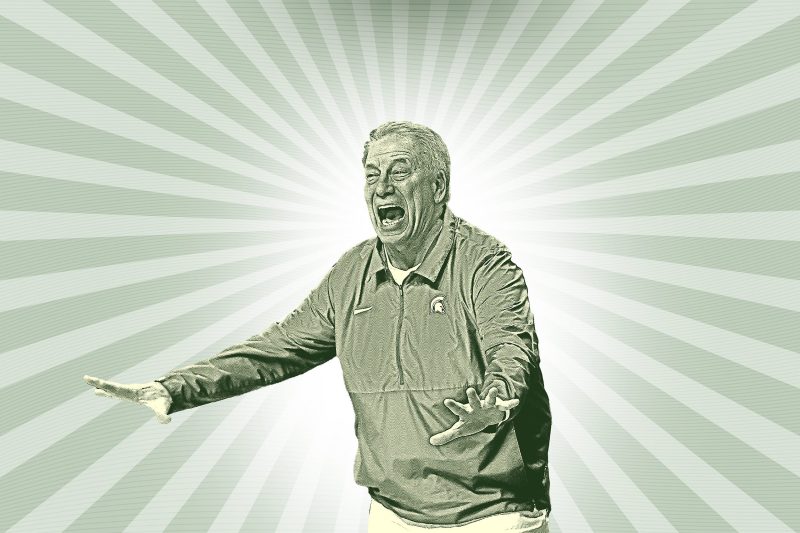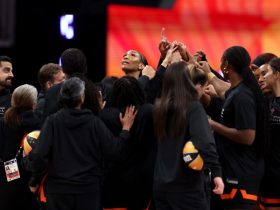Nearly three decades ago, Michigan State University offered Tom Izzo a five-year, $540,000 contract to be its next men’s basketball coach. He didn’t bother countering or negotiating. In fact, he didn’t even have an agent.
In the years since, Izzo has led the Spartans to eight Final Four appearances and a national championship in 2000 – emerging as one of the sport’s iconic coaches and, in many ways, the face of the university. His contracts have gotten more lucrative and complex as a result, but he said his approach at Michigan State hasn’t changed.
‘I’ve never negotiated a contract,’ Izzo told USA TODAY Sports. ‘Ever.’
Nor does he have an agent.
‘I heard I’m one of the only dumb ones,’ he added, with a laugh.
IT’S BRACKET MADNESS: Enter USA TODAY’s NCAA tournament bracket contest for a chance at $1 million prize.
It’s no surprise that Izzo, who spent 12 seasons as a Michigan State assistant before being promoted to head coach in 1995, is once again among the highest-paid men’s basketball coaches in the country in 2024. According to USA TODAY Sports’ annual review of coaching compensation, the 69-year-old is making roughly $6.2 million this season, which puts him third behind only Bill Self of Kansas and John Calipari of Kentucky.
What’s unusual, however, is the way that Izzo and Michigan State have gotten to this point – piecing together big-money contracts for almost 30 years with little public acrimony, even as Izzo’s stature has grown, administrators have come and gone, and the landscape of college sports has shifted.
“It was not common, not normal,” Izzo said. “I think, in this day and age, could I have made more money? Sure. Could I have made more money by leaving? Sure. But I’m also a relationship-based guy over a transaction-based guy. And I had good relationships.”
Tom Izzo is face of Michigan State, community
Following the recent retirements of Mike Krzyzewski at Duke and Jim Boeheim at Syracuse, few current men’s basketball coaches have more cachet at their schools than Izzo – a man so entwined with Michigan State that the university’s new football facility bears his name.
His friends note that he has been a constant – and, in many ways, an ambassador – for a university that has dealt with its fair share of tragedy and controversy in recent years, including the Larry Nassar scandal and Mel Tucker’s firing for sexual harassment.
In the aftermath of an on-campus shooting last year, Izzo was among those asked to speak at a vigil.
“He’s a face of Michigan, in a way,” former Michigan State athletics director Mark Hollis said. “(University of) Michigan fans respect Tom Izzo. He’s got that kind of role here, in the state.”
And yet, Hollis and other former administrators at the school insist that Izzo has shown little interest in using that stature – or sporadic interest from NBA teams – to squeeze money out of his employer. He said he has never felt the need to involve an agent. And Michigan State has made sure he never had a reason to do so, taking steps to proactively raise his salary or give him new perks.
Under the terms of his contract, Izzo has the choice to transition into the role of “special university advisor to the athletic director” for up to six years. That role would pay him $6.2 million in his first year and $750,000 each year for five years thereafter.
“I don’t want to sound like I’m some great guy that just said, ‘I don’t care about the money,’ ” Izzo said. “Everybody cares about the money. I just had faith that my people would treat me fairly.”
Tom Izzo’s career payday upward of $93M as head coach
For Izzo, who was inducted into the Naismith Memorial Basketball Hall of Fame in 2016, the approach has no doubt paid off.
According to USA TODAY Sports research, he has pocketed a colossal amount of money in his 29 years as the head coach of Michigan State – at least $93 million in salaries and bonuses, not adjusted for inflation.
While he has never been the highest-paid coach in the country, he has never ranked worse than seventh since USA TODAY Sports started tracking men’s basketball compensation in 2006-07.
I don’t want to sound like I’m some great guy that just said, ‘I don’t care about the money.’ Everybody cares about the money. I just had faith that my people would treat me fairly.
Tom Izzo, Michigan State men’s basketball coach
But Peter McPherson, who hired Izzo and handled several of his coaching contracts as Michigan State’s president from 1993 to 2004, believes the university has gotten plenty out of the relationship, too.
‘Izzo has earned his money many times over, when you look at what he’s brought to the school, the image,’ said McPherson, who went on to spend 16 years as the president of the Association of Public and Land-grant Universities after leaving East Lansing.
‘He’s been a unifier in these fairly troubled times in recent years, a spokesman of ethical behavior and common sense. His unifying voice has been extremely good for Michigan State.’
McPherson hired Izzo in 1995 on a starting salary of $108,000 per year. He quickly increased Izzo’s compensation package to $440,000 and $600,000 when the program started winning.
The 83-year-old said he made a conscious effort to stay ahead of the market, and he always dealt with Izzo directly on contractual issues.
“I don’t know who Tom talked to, but he wasn’t uninformed,” McPherson said. “He had a pretty good idea of what other people were making and some of the considerations.”
Tom Izzo: ‘I liked where I was at. I liked the way I was treated’
By the time the Spartans won the 2000 national championship, Izzo was making north of $725,000 – with nearly $200,000 more in potential bonuses, and a base salary that had even surpassed McPherson’s. Athletics department revenues were up. University fundraising had skyrocketed. Then, the Atlanta Hawks came calling.
In the first significant courtship of Izzo, the NBA franchise offered him a reported $3 million per year. He rejected Atlanta’s offer and told reporters he would not be seeking a raise, endearing him to local fans.
“Just about every job I was offered was more money than I was making,” Izzo recalled to USA TODAY Sports. “I don’t know. I liked where I was at. I liked the way I was treated. I felt like they appreciated me, and I appreciated them. How backwards is that? That’s illegal nowadays, isn’t it?”
While Izzo stresses that he never negotiated a deal with Michigan State, that’s at least in part because the university did its best to beat him to the punch.
After the Atlanta job fizzled, for example, McPherson upped Izzo’s base pay to $1.3 million and invested $300,000 more per year on his behalf in a university investment account – with the coach eligible to withdraw the money, and any earnings, if he remained in the job five years later. Private donors pledged to give him an additional longevity bonus of $3.4 million, which he earned in 2006.
‘You eat what you kill,’ MSU trustee Joel Ferguson told The Lansing State Journal at the time. ‘And he has killed enough to eat.”
Relationship with Michigan State works because of transparency
Atlanta was hardly the only suitor that came calling for Izzo over the years. The Cleveland Cavaliers wanted to hire him as their head coach in 2010, and Kentucky and Oregon were among the top-tier college programs who were rumored to have pursued him.
“The only sneaky thing I ever did with him is Kentucky was pursuing him once, and I knew the day that they were going to make the phone call,” Hollis recalled. “So I took him to the Masters. And you couldn’t take your phone on the course.”
Hollis was Michigan State’s athletics director from 2008 to 2018, but his relationship with Izzo stretched back decades before that; They were roommates in East Lansing in the mid-1980s, and Izzo was the best man at Hollis’ wedding.
Hollis believes Izzo is unique not because he repeatedly passed on opportunities to leave Michigan State but because of the unusual transparency with which he handled those opportunities. On multiple occasions, for example, Izzo invited Hollis to sit in on phone conversations with NBA owners about potential job offers and salary details.
Even considering their personal relationship, that’s almost unheard of in the cloak-and-dagger coaching searches of today.
“There are coaches that will use rumors like ‘this pro team or this college team wants me, what are you going to do?’” Hollis said. “Tom did not ever play that game with me when I was an AD.”
Hollis said thorny situations such as NBA offers were made easier because Izzo didn’t have an agent – many of whom, in Hollis’ view, “would leverage even the sniff of an opportunity against a school to get a raise.”
Izzo stressed that he doesn’t have anything against agents or coaches who hire them, and he noted that he has sought advice on his contracts and career from various people over the years – including former agent and Michigan State alum Molly Fletcher. Fletcher counseled Izzo in a variety of areas, including speaking and branding opportunities, but did not formally involve herself in his contract negotiations at Michigan State.
‘It’s never been about money to Tom,’ said Fletcher, who is now a motivational speaker and author.
‘The truth is, when other opportunities came his way, he wanted to do everything he could for (the public) to not know.’
It is exceedingly rare for head coaches to go without an agent – especially well-established ones like Izzo, who command the highest salaries and have the most complicated deals. Some coaches find agents to be useful intermediaries that can help advance their careers. The most powerful among them can manipulate the broader market by positioning their clients as candidates for vacant jobs, then parlaying that outside interest into an improved contract or additional perks.
Izzo said he wasn’t interested in any of that. He’s spent almost the entirety of his working life in East Lansing. It’s where he married his wife, Lupe, and raised two children; His son Steven, whom the Izzos adopted as a baby, is a walk-on guard on this year’s basketball team.
‘Everybody says what I didn’t get if I would’ve maybe used it to negotiate,’ Izzo said. ‘But do you ever think of what I did get?’
Tom Izzo ‘cares about the people’
Only one active head coach in Division I men’s basketball has spent more time leading his current school than Izzo has at Michigan State: Greg Kampe, who has been the head coach at Oakland University since 1984.
In fact, with the exception of a forgettable seven-week stint at Tulsa in 1986, Izzo has spent nearly two-thirds of his life coaching basketball in East Lansing – first as an assistant coach under his mentor, Jud Heathcote, then the last 29 as head coach.
‘He cares about the people at Michigan State,’ Fletcher said. ‘The things that Tom does that don’t directly contribute to basketball, and don’t contribute directly to his players, but contribute to the university as a whole, is astounding.’
In that time, Izzo has worked with six university presidents, six athletics directors and eight football coaches, including interims. A seventh president, Kevin Guskiewicz, took over last week.
He’s also helped the university navigate tragedy and controversy.
From 2017 to 2019, multiple top officials at Michigan State – including two consecutive presidents – were forced out in the wake of the scandal involving Larry Nassar, the former USA Gymnastics team doctor and MSU employee who was convicted of sexual assault. Hollis resigned days after Nassar’s conviction. The school reached a $500 million settlement with Nassar’s victims in 2018.
Then, last fall, Michigan State dealt with another scandal, firing football coach Mel Tucker amid allegations of sexual harassment levied by a prominent anti-sexual violence advocate. Tucker and the school are being sued for $75 million in damages.
“Michigan State’s really had some really hard times the last decade,” said Kampe, a longtime friend of Izzo’s. “And who’s the one person that you can always look at and say this is who really Michigan State is? It’s Tom Izzo.”
‘The grass isn’t always greener’
Hollis said Izzo was always comfortable with a contract if he understood how it fit into the athletics department’s broader plans – specifically with regards to football, where he said the coach recognized “if football’s doing well, everybody’s doing well.”
Current Michigan State athletics director Alan Haller echoed that sentiment in a statement provided to USA TODAY Sports by a school spokesperson.
“At multiple points throughout his career, Coach Izzo has either taken less than the market would dictate or not pursued a new contract to allow the athletics department to make commitments in other areas, allowing us to elevate the entire department,” Haller said.
Haller said Izzo’s most recent contract, which he signed in 2022, was in part an attempt to compensate him for past efforts he’s made to help the athletics department.
The deal increased his base salary and supplemental pay to $5.52 million − a $2 million increase from his previous contract signed in 2018 − and has no expiration date, with one year automatically added when each season ends. While it does not include a mandatory percentage raise or longevity bonus as his previous deal did, it does contain a variety of perks, including 25 hours of personal airtime on a private jet each year and the cushy post-coaching job.
Izzo claimed he doesn’t know some of the details of his own contract, but he said he considers it fair. He refers to something Heathcote used to say, that “a good deal is a good deal for you and a good deal for me.”
His contractual relationship with Michigan State, he said, has been a good deal.
“I got to do it, maybe, the right way,” Izzo said. “Did it cost me money? I don’t know. I know I had job offers for a lot more money, but I also know that the grass isn’t always greener. I’ve got a pretty good thing here.”
Contact Tom Schad at tschad@usatoday.com or on social media @Tom_Schad and Steve Berkowitz at sberkowi@usatoday.com or @ByBerkowitz






